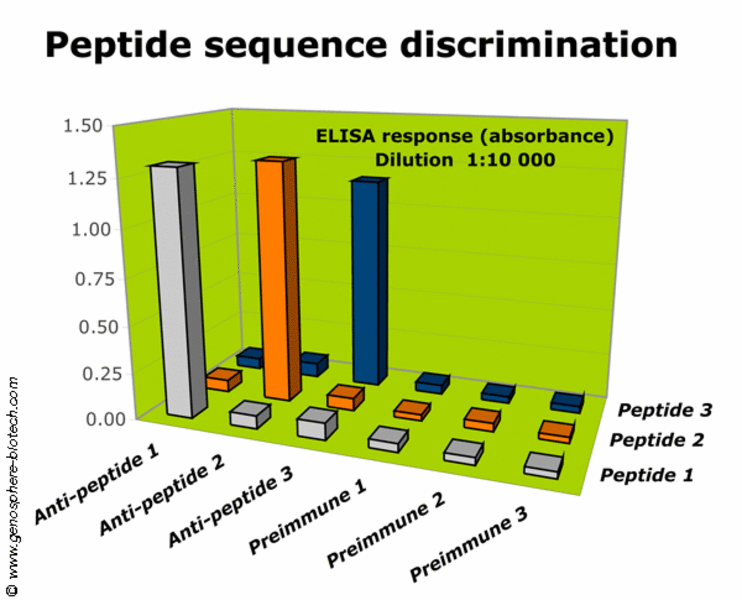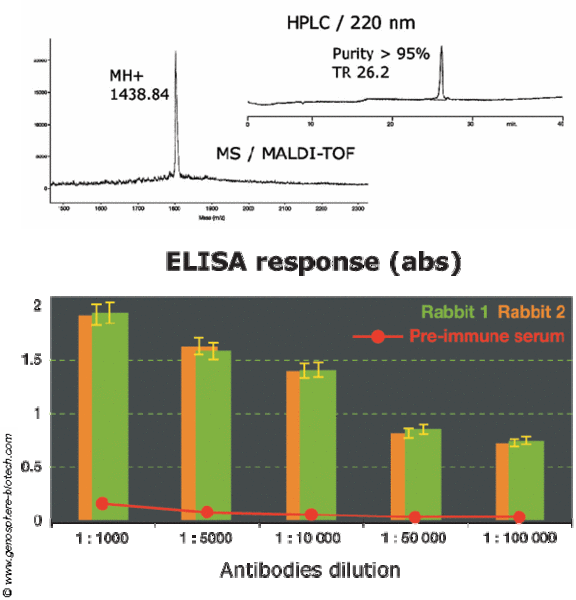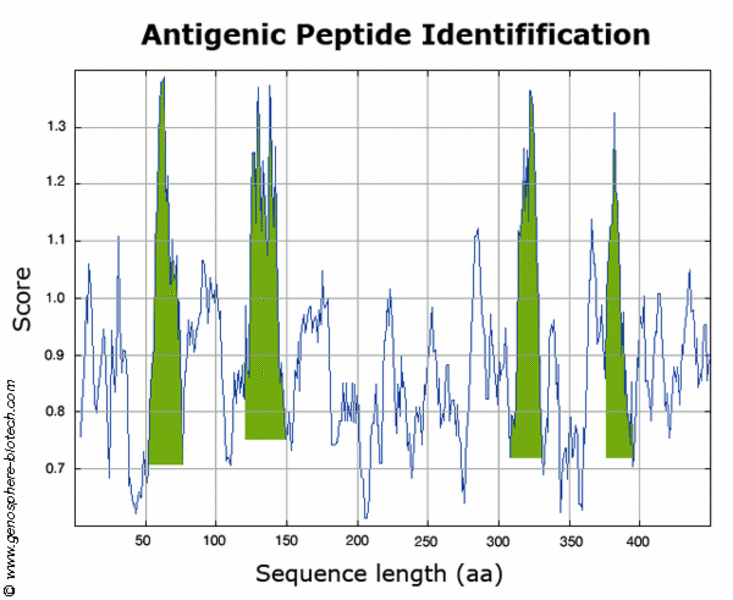When your protein of interest is not available as antigen, one approach is to identify shorter peptides (usually 10 to 25 aa long) from target sequence to use as haptens and thus generate anti-peptide antibodies.
Genosphere biotechnologies offers full custom anti-peptide antibodies services at a competitive price. Provide your peptide sequence, select your species, and we’ll produce a high titer antisera within 14 weeks. We can help you with design and choice of your peptide sequence. Drawing on many years of industrial experience in producing all kinds of peptides, Genosphere Biotechnologies manufactures peptides and protein conjugates (KLH, BSA, OVA…) with purity > 90%.
While many factors will influence overall antibodies quality, controlled peptide synthesis is important for achieving good specificity and refined sequence discrimination (Figure 1).

Three 15 aa peptides were synthesized, purified, conjugated to KLH, and the resulting immunogens were used independently to raise polyclonal antibodies in rabbits. Sequences differed by 8 aa alternatively. ELISA cross-analysis using 1:10 000 dilutions was performed as shown. Results indicate a complete discrimination of the produced antisera against other sequences with ELISA responses similar to that of pre-immune sera.
Standard package offer: rabbits, guinea pigs, rats, mice
The standard anti-peptide service package includes:
• Synthesis, purification & KLH conjugation of your peptide
• Immunization of two animals:
– Rabbits: 80-100 ml of ELISA titered antiserum
– Guinea pigs: 5-8 ml of ELISA titered antiserum
– Rats: 2-3 ml of ELISA titered antiserum
– Mice: 1-2 ml of ELISA titered antiserum
• Pre-immune control serum
• Full report with ELISA analysis data
• 2 mg of unconjugated peptide (with HPLC & MS data, purity >90%)
Alternatively, we can use your own program or yet design a specific protocol to meet your requirements such as different time periods collection, more animals, or several species per project. All projects may be extended beyond initial termination date for additional antiserum collection. Please contact us: ab@genosphere-biotech.com

Every antibodies project undergoes stringent quality control procedures including ELISA titration against pre-immune sera as negative control, peptide analytical HPLC, and mass spectrometry.
Peptide-carrier protein conjugation
Synthetic peptides are too small to induce a good immune response for the purpose of antibodies production in animals. As a result, they are rarely used as antigens. Instead, peptides are covalently linked to a larger protein and the resulting conjugate is used as immunogen. It is critical for further successful immunization that the peptide-hapten to protein-carrier molar ratio be very high, and that all epitopes on the peptides be properly oriented in order to induce high titer specific immune response. To that end, peptide quality and well-controlled conjugation chemistry are key to a successful immunization project.
Our standard offer includes the following peptide conjugation conditions:
- Protein carrier: KLH (Keyhole Limpet Hemocyanin). It is a high molecular weight protein isolated from a marine mollusc species with very potent antigenicity when submitted to the immune systems of mammals or birds. In addition, it has a high number of free amino groups available for hapten coupling.
- Coupling: via a terminal cys (N- or C-terminal) on peptides using sulfhydryl chemistry and amino groups on KLH. This approach using two different coupling chemistries, in a two-steps reaction with isolation of intermediate products permits directed and controlled orientations of the peptides onto the globular KLH carrier.
Peptide should be at least 10 residues long and include a terminal cys for conjugation purposes.
However, in some cases, antibodies to shorter sequences are required, and we have developed a special efficient protocol for smaller chains peptides (5-10 aa). In addition, some projects call for the coupling of the carrier protein directly to the N-terminal amine of the peptide. Please contact us with your project details.
Multiple Antigen Peptides (MAP)
In some instances an alternative to protein carrier conjugation of the peptide hapten may be the use of multiple antigen peptides (MAP). MAP contains 8 copies of the peptide, synthesized directly on an 8-armed branched lysine core using a special resin. The resulting multimeric is a large macromolecule (10-15 kDa) which has a high molar ratio of peptide antigen to core molecule and does not require further conjugation to a carrier protein.
Quality control
Our synthetic peptides are controlled by reversed-phase HPLC and mass spectrometry (Figure 2). Immune responses are monitored all along and immunization program adapted where necessary. Final ELISA is performed on your antisera and pre-immune sera for individual animals and we guarantee a minimum good titer for all your projects (Figure 2). A detailed ELISA report is supplied with every project and complete instruction and reagents used are described so you can reproduce the analyses.
Antigenic peptide design
When evaluating a protein sequence for antigenic determinants, it is critical to choose regions that are antigenic, hydrophilic, and with secondary structures that allows good solvent accessibility (Figure 3). Peptide chemical synthesis feasibility will guide the decision as well. One or several peptides are then synthesized and used as epitopes simultaneously or separately for immunisation. The antibodies thus generated should recognize the peptide sequence(s) within the parent protein. Using appropriate computer algorithms, we will analyze your protein sequence and we will suggest several peptide candidates for your antibodies project.

Graph representation of the results generated by computer algorithm. The darken areas represent peptide stretches within the protein sequence that meet criteria for antigenicity.

